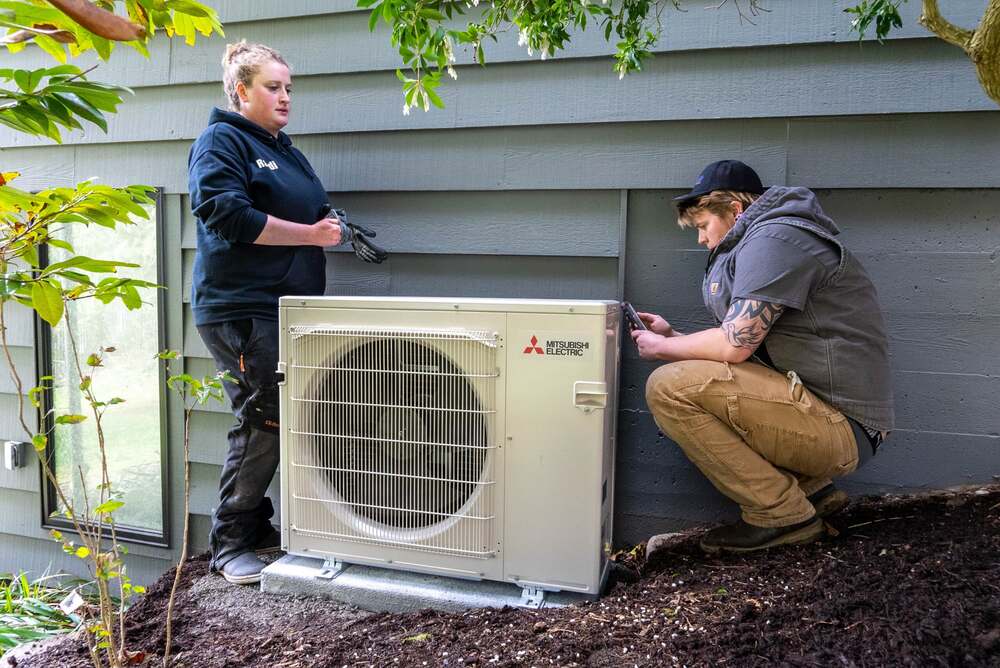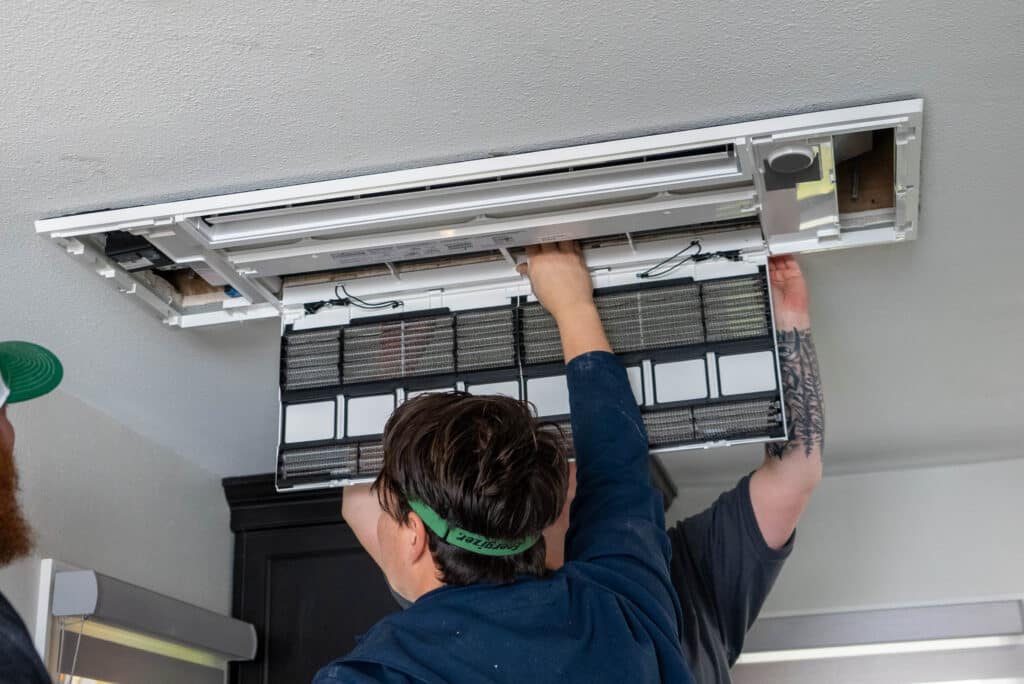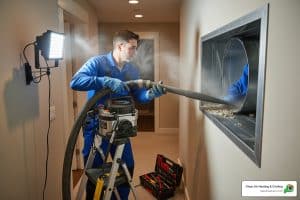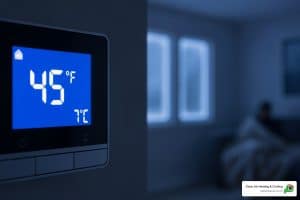How long do mini split systems last? This is a common question for homeowners considering ductless mini-split HVAC systems. Let’s get straight to the point: a well-maintained mini split system can last 10-25 years, depending on several factors. Here are the key points you should know:
- Average Lifespan: 10-15 years, but with proper care, some can reach up to 20 years or more.
- Maintenance: Regular upkeep is crucial for extending the lifespan.
- Installation Quality: Poor installation can shorten the system’s life.
- Equipment Quality: High-quality materials make a significant difference.
Mini split systems have become a popular choice for heating and cooling homes, especially in regions like Whatcom, Skagit, and Snohomish County, where energy efficiency and comfort are top priorities. At Clean Air Heating & Cooling, we understand the importance of investing in durable HVAC solutions. An extended lifespan means you get more value for your money, less frequent replacements, and better overall performance.
Choose wisely and maintain your system well, and it could serve you efficiently for decades.

How Long Do Mini Split Systems Last?
Ductless mini split systems are a popular choice for heating and cooling homes. But how long do mini split systems last? On average, a well-maintained mini split system can last between 10 to 15 years. With proper care, some units even reach up to 20 years.
Few home appliances can match this lifespan, highlighting the value for money these systems offer. However, several factors can influence their longevity:
- Maintenance: Regular upkeep is crucial. This includes cleaning air filters monthly and scheduling professional maintenance at least twice a year.
- Usage Frequency: Systems used more frequently may wear out faster. Adjusting thermostat settings to milder ranges can help reduce strain.
- Equipment Quality: Higher-quality units tend to last longer. Investing in a reputable brand can save money in the long run.
- Installation: Proper installation by skilled technicians ensures optimal performance and durability.
- Environmental Conditions: Coastal or arid regions can impact the system’s durability due to salt and dust.

For instance, traditional air conditioners typically last for 10 years, while mini splits often surpass that, reaching up to 20 years with the right care.
So, if you’re looking for an HVAC system that offers longevity and efficiency, a mini split is a solid choice. Proper maintenance and smart usage can help you get the most out of your investment.
Factors Influencing the Longevity of Your Mini Split System
How long do mini split systems last? With proper care, these systems can last up to 20 years. Here are some key factors that influence their lifespan:
Maintenance and Care
Regular maintenance is essential for maximizing the lifespan of your mini split system. Cleaning air filters monthly is crucial for maintaining optimal airflow. Professional servicing at least twice a year can help identify and fix issues before they become major problems. Technicians can clean internal components and ensure everything is functioning efficiently.
Usage Frequency
Frequent use can wear out components faster. However, you can extend the system’s life by moderating thermostat settings. Keeping indoor temperatures between 71-78 degrees Fahrenheit can reduce strain on the system. Also, adjusting the thermostat when you’re away can help control energy costs and minimize wear.
Quality of Equipment
The quality of your mini split system matters. High-quality materials and reputable manufacturers offer more durable and reliable units. Consulting an expert can help you choose a system that fits your needs and comes with good warranties.
Correct Installation
Proper installation is crucial for the effectiveness and longevity of your mini split system. Skilled professionals should place indoor and outdoor units strategically and ensure that connecting pipes and cables are installed correctly. Poor installation can lead to inefficiencies and a shorter lifespan.
Environmental Conditions
Environmental factors like coastal air or dust can impact your system’s durability. Coastal areas may cause corrosion due to salty air, while arid regions can clog filters faster. Regular maintenance can help mitigate these issues.
Maximizing the lifespan of your mini split system involves a combination of regular maintenance, moderate usage, high-quality equipment, proper installation, and awareness of environmental conditions. Taking these factors into account can help you get the most out of your HVAC investment.
Comparing Lifespan: Mini Split vs. Central HVAC Systems
When deciding between a mini split system and a central HVAC system, lifespan is a key factor to consider. Understanding how these systems compare can help you make an informed decision.
Ductless vs. Central HVAC
Ductless mini split systems and central HVAC systems differ in several ways that impact their lifespan. Mini splits generally last longer, often up to 20 years with proper maintenance. In contrast, central HVAC systems typically last around 10-15 years.
Compressor Issues
The compressor is the heart of any HVAC system. It’s also one of the most common points of failure. In central systems, leaky ducts can draw in dirt and dust, leading to dirty evaporator coils. This makes the compressor work harder, shortening its lifespan. Mini splits avoid these issues because they don’t use ducts.
Dirty Evaporator Coils
In central HVAC systems, dirty evaporator coils are a frequent problem. Leaky ducts can pull in dirt and dust, causing the coils to get dirty and reduce efficiency. This forces the compressor to work harder, leading to potential failure. Since mini splits don’t have ductwork, they largely avoid this issue.
High Static Pressure
High static pressure can also affect the compressor in central HVAC systems. Improper duct sizing or installation can lead to increased stress, causing the compressor to overheat. Mini splits don’t face this problem as they operate without ducts, making them more reliable and durable.
Hard Starts
Central HVAC systems often experience hard starts, which can cause significant wear and tear. These systems start at full speed, putting a strain on the compressor. In contrast, mini splits use inverter technology with variable speeds. This allows the compressor to ramp up and down gradually, reducing wear and extending its lifespan.
Conclusion
In summary, ductless mini split systems tend to have a longer lifespan than central HVAC systems due to their design and advanced technology. They avoid common issues like dirty evaporator coils, high static pressure, and hard starts, making them a more durable and efficient choice.
Next, let’s explore some tips for extending the life of your mini split system.
Tips for Extending the Life of Your Mini Split System
To get the most out of your mini split system, you need to take care of it properly. Here are some practical tips to help you maximize its lifespan:
Efficient Usage
Turn Off When Not in Use: While mini splits are designed to run efficiently, turning them off in rooms that aren’t being used can save energy and reduce wear.
Auto Fan Setting: Use the auto fan setting to let the system adjust its speed based on the room’s temperature. This ensures optimal efficiency and less strain on the compressor.
Blocking Sun: Close blinds or curtains during hot days to keep your home cooler. This reduces the workload on your mini split, extending its life.
Regular Maintenance
Cleaning Indoor and Outdoor Units: Regularly clean both the indoor and outdoor units to keep them free of dust and debris. This ensures efficient operation and prevents overheating.
Annual Professional Tune-Ups: Schedule a professional HVAC technician to perform an annual check-up. They can spot and fix minor issues before they become major problems, helping your system last longer.
Choosing the Right Size
Importance of Proper Sizing: If the system is too small, it will work harder and wear out faster. If it’s too large, it will short cycle, which also leads to wear and tear.
Consulting HVAC Experts: Always consult with an experienced HVAC contractor to calculate the correct size for your home. They can provide expert recommendations custom to your specific needs.
Minimizing Heat Sources
Closing Blinds: Keep blinds or curtains closed during the day to block out heat from the sun. This helps maintain a cooler indoor environment and reduces the load on your mini split system.
Reducing Indoor Heat Sources: Limit the use of heat-generating appliances like ovens and stoves during the hottest parts of the day. This will help maintain a consistent indoor temperature, making it easier for your mini split to operate efficiently.
By following these tips, you can significantly extend the lifespan of your mini split system, ensuring it keeps your home comfortable for many years to come.
Frequently Asked Questions about Mini Split Systems
How Often Do You Need to Replace a Mini Split?
The lifespan of a mini split system can vary based on several factors, but on average, you can expect it to last between 10-15 years. With proper care and maintenance, some systems can even last up to 20 years or more. Regular maintenance, such as cleaning filters and ensuring the system is free of debris, can significantly extend its life.
Usage patterns also play a crucial role. A system that runs constantly will wear out faster than one used less frequently. However, thanks to inverter technology, modern mini splits are designed to run efficiently even with continuous use.
Do Mini Splits Need Maintenance?
Yes, regular maintenance is essential to keep your mini split system running efficiently and prolong its lifespan. Here are some key maintenance tasks:
- Cleaning Filters: The air filters in your mini split should be cleaned or replaced every few months. Dirty filters can reduce airflow and efficiency.
- Professional Checks: An annual inspection by an HVAC professional can catch potential issues early. They can check the refrigerant levels, clean the coils, and ensure all components are in good working condition.
- Outdoor Unit Care: The outdoor unit should be kept free of debris, such as leaves or dirt, to ensure proper airflow and operation.
At What Temperature Do Mini Splits Stop Working?
Mini splits are designed to operate efficiently in a wide range of temperatures. However, their efficiency can drop in extreme conditions.
- Temperature Efficiency: Most mini splits can operate effectively in temperatures as low as -5°F to -15°F. For colder climates, some models come with a base pan heater, which prevents ice buildup and ensures the system continues to run smoothly.
- Economy-Level Systems: Lower-end models might struggle in extreme temperatures compared to higher-end units. Investing in a quality system can provide better performance and longevity.
By understanding these factors and performing regular maintenance, you can ensure your mini split system remains efficient and reliable for many years.
Conclusion
In summary, mini split systems are a fantastic investment for your home, offering impressive longevity and efficiency. With proper care, these systems can last anywhere from 10 to 20 years, providing you with comfort and energy savings for a long time.
Benefits of Proper Maintenance
Regular maintenance is key to maximizing the lifespan of your mini split system. Simple tasks like cleaning air filters and scheduling professional check-ups can make a big difference. Well-maintained systems not only last longer but also run more efficiently, saving you money on energy bills.
Clean Air Heating & Cooling Services
At Clean Air Heating & Cooling, we understand the importance of reliable and efficient HVAC systems. Our team of experts is here to help you with everything from installation to maintenance. We offer:
- Free Estimates: Get a clear idea of costs before you commit.
- Professional Installation: Ensure your system is set up for optimal performance and longevity.
- Regular Maintenance Plans: Keep your system in top shape with scheduled check-ups.
For more information, visit our Mini Split Services Page and see how we can help you stay comfortable year-round.
Contact Information
Ready to extend the life of your mini split system? Contact Clean Air Heating & Cooling today for a free estimate and expert advice.
- Phone: 360-123-4567
- Email: info@callcleanair.com
- Website: https://callcleanair.com
Don’t wait—ensure your home stays comfortable and efficient with Clean Air Heating & Cooling.





